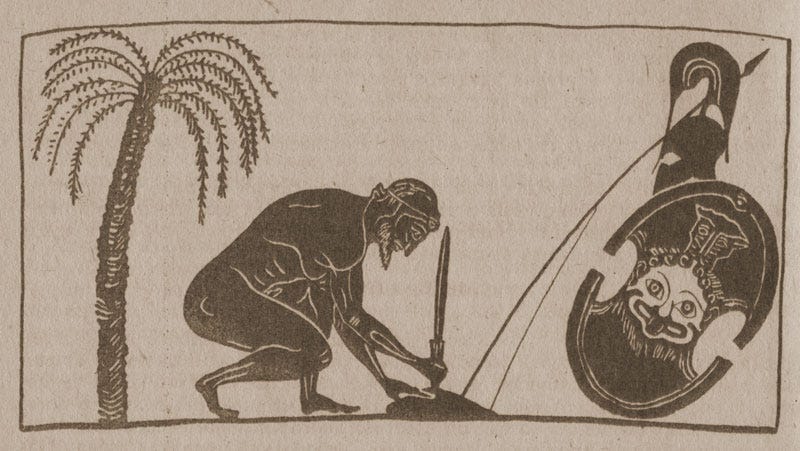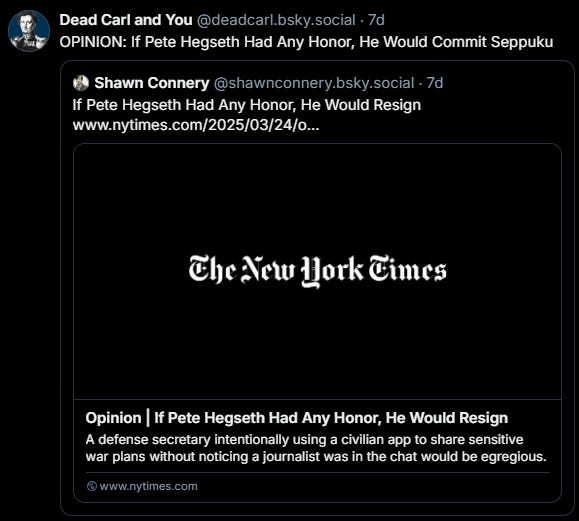A Modest Proposal For Restoring the Warrior Ethos
Signalgate and How the Secretary of Defense Can Preserve His Honor
If Pete Hegseth had any honor he’d commit seppuku.
For those unfamiliar, seppuku (or harakiri) refers to ritual suicide by disembowelment, as practiced by the Samurai class. To prevent capture or other dishonor, seppuku was a means by which a samurai could preserve his warrior’s honor.
Pete Hegeseth has pledged to restore the warrior ethos to America’s military. The warrior ethos traditionally demands self-destruction as compensation for failure. The Japanese example is the most well-known, but it was also expected for honorable Romans to fall upon their own swords rather than suffer disgrace. If Hegseth wants to preserve his own honor and adhere to the warrior ethos, then there is a clear course of action open to him.

Taking the idea of restoring the “warrior ethos” to its logical extreme is humorous, but it drives at a real point (no pun intended). Everyone in that Signal chat knew that it was an inappropriate medium to discuss operations. “Don’t have a group chat for talking about ongoing operations” is advice that goes alongside “don’t add or subtract from the population” as an obligatory statement exclusively for the benefit of morons. That a group of individuals in senior leadership positions took part in this is humiliating for each of them.
It’s true that everyone makes mistakes, but that’s why not everyone is entrusted with our national security. Carelessness disqualifies you from the responsibility. Mere professionalism—let alone “warrior ethos”—demands that those involved recognize their own unsuitability and atone.
However, I don’t believe it would be accurate to characterize this as carelessness. This is not a good-faith mistake. You can’t plead ignorance when it comes to understanding what’s wrong with using an unsecured platform to share operational details. You especially can’t do this if you’re the Secretary of Defense or the National Security Advisor. More likely than sheer stupidity is that the chat is a product of arrogance. Its members feel that the usual rules governing the handling of sensitive information simply do not apply to them. They know they’re not permitted to use Signal to discuss these matters, but they just didn’t care.
You may have noticed that I have so far not mentioned the adding of a journalist to this chat. That mistake is only relevant because it exposed the willful negligence of the members of the chat. Security protocols around sensitive information exist to prevent a situation where you can fat-finger a random civilian into the loop. The exposure was a consequence of treating sensitive information carelessly.
While the cover-up is not worse than the crime, it is more dishonorable. Rather than admitting fault, each of the principals involved have repeatedly lied by giving conflicting explanations for the breach of security. They have been shameless in their attempts to evade responsibility.
To fail—and to fail gravely—is to be human. But honor, whether it is professional or a warrior ethos, demands self-sacrifice. By sacrificing yourself in recompense for a mistake it is proof of dedication, to the cause, the nation, and the profession above your own personal interests.
It is this test that each of the principals fail by choosing not to fall on their own swords. In warrior terms, it is cowardice; in professional terms, betrayal of the profession. Warriors that will not admit responsibility for failure and atone are faithless. Officers that dissemble when disgraced harm the profession for the sake of personal gain. When failure and cowardice meet, the transgressor is typically made an example of to maintain the honor of the group.
In our genteel age, the traditions of the warrior ethos do not have quite the bite they once did. Hegseth and the “cult of the operator” bemoan this while ignoring that a return to tradition would call for him to spill his lifeblood (if not his entrails) for this kind of failure. But modern states do not rely on a warrior caste, as the Germanic tribes did. Instead, recalling Rome at its height, they rely on professional soldiers. Fortunately for Hegseth, a professional military means a less gory method of self-destruction is available for the dishonored: resignation.
This goes for all the people involved, but especially for those that have made pretensions to warrior status. JD Vance, for example, purports to be a warrior and so ought to also fall on his proverbial sword and resign. DNI Gabbard, as an officer, is also obligated to resign in atonement.
If they fail to fulfill their duty to resign, they must be treated harshly in order to preserve the professional dignity of the armed forces—there must be consequences for dishonor. If people aren’t drummed out when they disgrace themselves, it creates a culture of impunity and ends any sense of respect associated with the institution. Consequences for dishonor (or lack thereof) set a precedent.
I have no faith whatsoever that there will be any accountability. Virtually all of these people are so lacking in expertise that shamelessness is their primary qualification for their appointments. But it’s still worth drawing the contrast between what traditional martial ethos demands of these people (who claim to want to “restore” it) and their actual conduct. They have shredded their own honor and stained that of our nation and armed forces. Yet they cannot find it within themselves to fall on their swords, in either the traditional or modern sense. It is rank cowardice from men who purport themselves to be warriors. Part of the warrior’s bargain is taking the consequences of failure on the chin. Professionals too are required to meet standards
Hegseth and co want the status of warriors, the honor that comes with being a military professional, but none of the duties. It’s on all of us—but especially professionals—to reject claims to privilege without duty. Shamelessness cannot be an antidote to disgrace, and there can be no honor that comes without responsibility.




The Prussians would leave a loaded pistol on his desk and close the door behind them as they left him alone with it
Hubris, lack of training, negligence... anyway you look at it, it was dicked up. There will be no accountability. Accountability only applies to "others"...